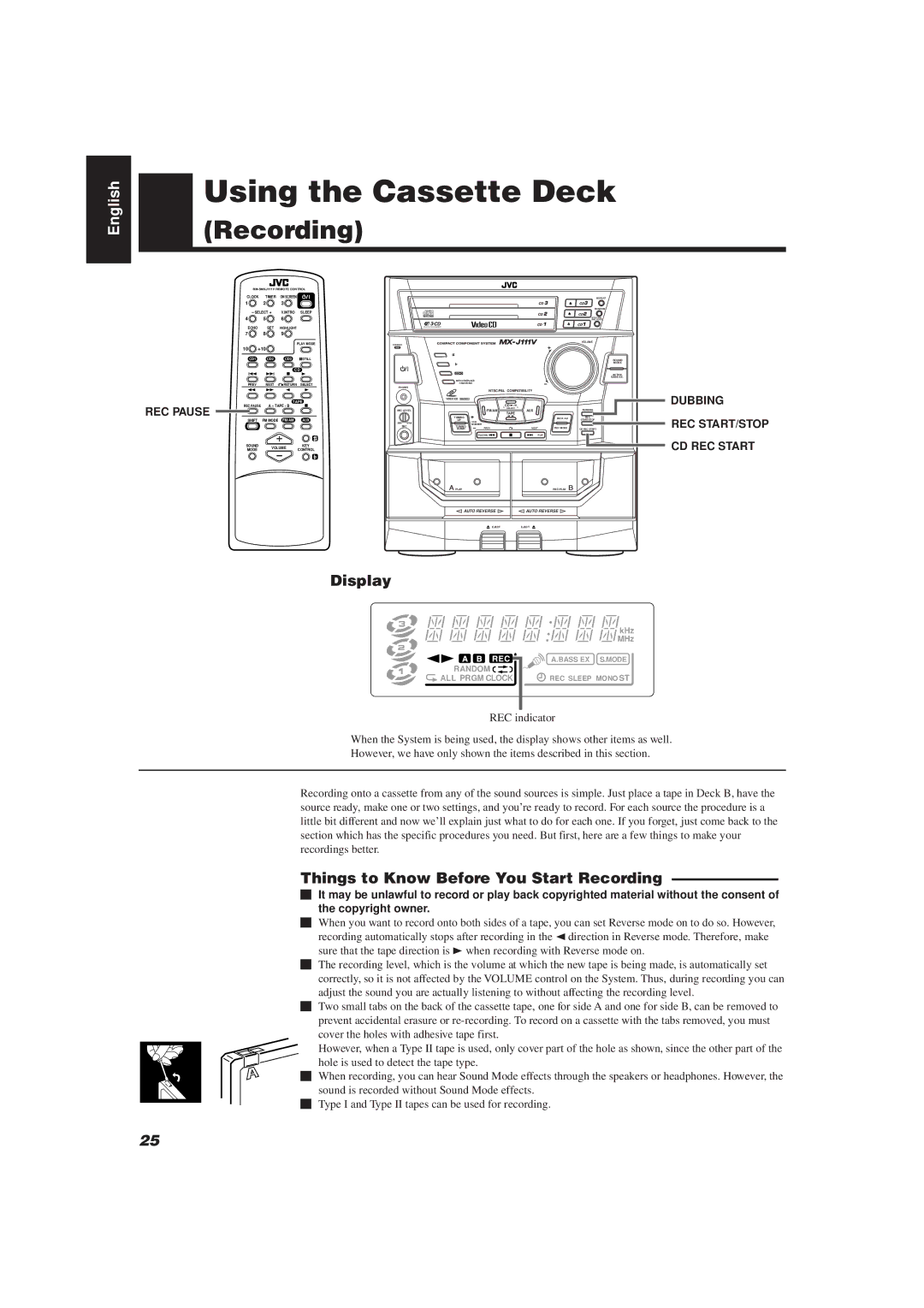
English
Using the Cassette Deck
(Recording)
|
|
|
|
|
|
| |||||
CLOCK | TIMER | ON SCREEN |
|
|
|
|
|
| REPEAT |
| |
1 |
| 2 | 3 |
|
|
|
|
|
|
|
|
– SELECT + | V.INTRO | SLEEP |
| COMPACT |
|
|
| RANDOM |
| ||
|
|
|
|
|
|
| |||||
4 |
| 5 | 6 |
|
| DIGITAL VIDEO |
|
|
| NTSC/PAL |
|
|
|
|
|
|
|
|
| ||||
|
|
|
|
|
|
| /PAL AUTO |
| |||
ECHO |
| SET | HIGHLIGHT |
| PLAY & EXCHANGER |
|
|
|
|
| |
|
|
|
|
|
|
|
| ||||
7 |
| 8 | 9 |
|
|
|
|
|
|
|
|
|
|
|
| PLAY MODE |
|
|
|
|
| VOLUME |
|
10 | +10 |
| STANDBY |
|
|
|
|
|
| ||
|
|
|
|
|
|
|
|
| |||
CD1 |
| CD2 | CD3 | STILL |
|
|
|
|
|
| SOUND |
|
|
|
|
|
|
|
|
|
|
| MODE |
|
|
| CD |
| ECHO |
|
|
|
|
| |
|
|
|
|
|
|
|
|
|
| ACTIVE | |
|
|
|
|
|
|
|
|
|
|
| |
|
|
|
|
|
|
|
|
|
|
| BASS EX. |
|
|
|
|
|
| MPX/V.REPLACE |
|
|
|
|
|
PREV |
| NEXT | RETURN | SELECT |
| /V.MASKING |
|
|
|
|
|
| PHONES |
|
|
|
|
|
| ||||
|
|
|
|
|
|
|
|
|
|
| |
|
|
|
|
|
|
| NTSC/PAL COMPATIBILITY |
|
| DUBBING | |
|
|
| TAPE |
| VIDEO CD |
| CD |
|
| ||
|
|
|
|
|
|
|
|
|
| ||
REC PAUSE | A – TAPE - B |
|
|
|
| SELECT |
|
|
| ||
REC PAUSE |
|
|
|
| MIC LEVEL |
| FM/AM | AUX |
| DUBBING |
|
|
|
|
|
|
|
|
| TAPE |
|
|
|
SHIFT |
| FM MODE | FM/AM | AUX |
| TUNING |
|
| DECK A/B | REC | REC START/STOP |
|
| VCD |
|
|
| START/STOP | |||||
|
|
|
|
|
| UP | PREV | NEXT | REV. MODE | ||
|
|
|
|
| MIN MAX | DOWN | CD REC START | ||||
|
|
|
|
| NUMBER |
|
|
|
| ||
|
|
|
|
| MIC | TUNING |
|
|
|
|
|
|
|
|
| i |
|
| P.DOWN | P.UP |
|
|
|
MODE |
|
|
|
|
|
|
|
|
| CD REC START | |
|
|
| CONTROL |
|
|
|
|
|
| ||
SOUND | VOLUME | KEY |
|
|
|
|
|
|
| ||
|
|
|
|
|
|
|
|
|
| ||
|
|
|
| I |
|
|
|
|
|
|
|
|
|
|
|
|
| PLAY |
|
| REC/PLAY |
|
|
|
|
|
|
|
| AUTO REVERSE | AUTO REVERSE |
|
| ||
|
|
|
|
|
|
| EJECT | EJECT |
|
|
|
Display
RANDOM ![]()
![]() ALL PRGM CLOCK
ALL PRGM CLOCK
kHz
MHz
A.BASS EX S.MODE
REC SLEEP MONO ST
REC indicator
When the System is being used, the display shows other items as well.
However, we have only shown the items described in this section.
Recording onto a cassette from any of the sound sources is simple. Just place a tape in Deck B, have the source ready, make one or two settings, and you’re ready to record. For each source the procedure is a little bit different and now we’ll explain just what to do for each one. If you forget, just come back to the section which has the specific procedures you need. But first, here are a few things to make your recordings better.
Things to Know Before You Start Recording ———————
oIt may be unlawful to record or play back copyrighted material without the consent of the copyright owner.
oWhen you want to record onto both sides of a tape, you can set Reverse mode on to do so. However, recording automatically stops after recording in the 2direction in Reverse mode. Therefore, make sure that the tape direction is 3 when recording with Reverse mode on.
oThe recording level, which is the volume at which the new tape is being made, is automatically set correctly, so it is not affected by the VOLUME control on the System. Thus, during recording you can adjust the sound you are actually listening to without affecting the recording level.
oTwo small tabs on the back of the cassette tape, one for side A and one for side B, can be removed to prevent accidental erasure or
However, when a Type II tape is used, only cover part of the hole as shown, since the other part of the hole is used to detect the tape type.
oWhen recording, you can hear Sound Mode effects through the speakers or headphones. However, the sound is recorded without Sound Mode effects.
o Type I and Type II tapes can be used for recording.
25
